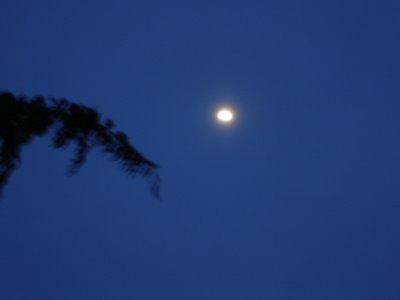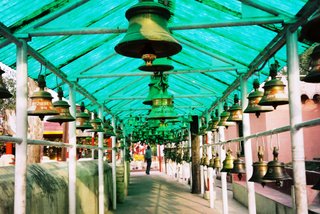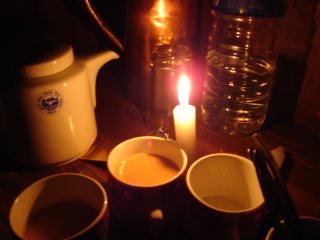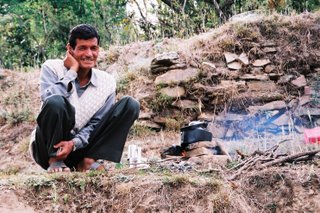Quarter Past Midnight at Binsar
 Amid profound but eerie silence, the night, faintly lit by a half moon, crawls carefully towards midnight, as if wary of disturbing the tranquility of the dense jungles it has descended upon. As the scented mountain breeze caresses trees, the gently rustling leaves become the voice of silence. A raccoon, caught unawares by the sudden beam of light from a metallic monster, scrams to safety in the bushes. Thousands of crickets hum in unison rendering harmony to the stillness of the night. I move with calculated steps to the only concrete structure in the vast maze of deodar and pine trees, taking care not to crush the brown leaves under my feet. No one speaks; no one wants to speak, when suddenly the mesmerising serenity is broken by a bird-call in the distance. The wilds are calling, and I have responded. I have reached Binsar.
Amid profound but eerie silence, the night, faintly lit by a half moon, crawls carefully towards midnight, as if wary of disturbing the tranquility of the dense jungles it has descended upon. As the scented mountain breeze caresses trees, the gently rustling leaves become the voice of silence. A raccoon, caught unawares by the sudden beam of light from a metallic monster, scrams to safety in the bushes. Thousands of crickets hum in unison rendering harmony to the stillness of the night. I move with calculated steps to the only concrete structure in the vast maze of deodar and pine trees, taking care not to crush the brown leaves under my feet. No one speaks; no one wants to speak, when suddenly the mesmerising serenity is broken by a bird-call in the distance. The wilds are calling, and I have responded. I have reached Binsar.Perched at an elevation of 2,412 m on top of the Jhandi Dhar hills in Kumaon, Uttaranchal, Binsar is the perfect place to commune with nature. Dense forests all around, with a spectacular view of the snow capped peaks and the Almora valley, Binsar is the epitome of serenity and tranquility. The spectacular landscape surrounded by forests of Himalayan oak and rhododendron, the panoramic views of Himalayan ranges and the scenic trails are the ideal setting for riding, trekking, camping and birdwatching.
For perennially bored individuals like me, Binsar is the perfect escape from dreary long hours of work at office. So off we (me and my friends) go to the Old Delhi railway station on April 7, with confirmed tickets to Kathgodam in our hands, only to realise that we are running 10 days ahead of schedule. Yes, my extremely smart and intelligent friend has got tickets for 17th. Interestingly, we are returning by the same train on the 9th of the same month. Some time management, that is. At 10:45 in the night now we are at the crossroads. We can either go home, or salvage the situation by taking another mode of transport. The latter takes preference and we are off to bus adda, only to realise, there are no buses to Almora at this point of the night. Now there is only one option and we take it. We hire a Toyota Qualis and by 12:30 we are out of Delhi, half-sleepy, half-excited, chatting, singing, sleeping in between…
Having withstood the night-long rollercoaster ride on UP’s bumpy roads, our spines are screaming for rest and we take a three-hour halt at Haldwani, a small town where, as we found out, it can be difficult to find a hotel. So, we settle for a dilapidated dharamshala. The accommodation comes cheap, for a meager Rs 25 a room. For many of my friends it was the first experience of community living, sharing a bathroom with strangers and sleeping on charpoys without mattresses. But who cares, we are so tired that within minutes we are snoring away to glory.
At noon it is time to start the journey uphill to Almora. As we roll off from Kathgodam, the meandering road, flanked by deodar-shrouded imposing hills on one side and nothing on the other, give a rollercoaster ride up and down the landscape. A depleted pre-monsoon river, along the road, gives us company. And when we look back at our achievement in height, no matter how paltry it is, it’s a visual treat. Further up the road as the moisture-laden breeze whizzes past us the placid Bhimtal Lake takes shape in front of our eyes. Vast expanse of soothing water acts as balm on fatigued travelers, we can’t resist staying put, but we must move as reaching Binsar late in the night is not a very good idea, we are informed.
With every metre achieved in height the visual pleasure increases ten-fold. The river hasn’t left our company as yet; it runs alongside making its way through sturdy rocks, forming ripples over pebbles, somewhere drying up, somewhere still and shallow but everywhere as clear as the morning rays of the sun. Looking at its swift, quiet movement, one can only imagine its unstoppable roaring assertion of existence during the monsoons. We have already forgotten about the bumpy ride. Who cares about the road, we can’t take our eyes off the picturesque landscape flanking the road. While on the right, huge rocks jutting out of gigantic hills threaten to push us down, on the left the bountiful valley invites with open arms. Fear and adventure was never so much fun.
 And before the beauty sinks in we are in the sleepy town of Almora asking for directions to the Chitai Temple. Conversations at leisure with a very helpful people is a humbling experience. Far far away from the malaise of the big cities, the pahadis ooze innocence. We are overwhelmed. We move towards the temple taking a route that even cyclists will think twice before trudging on. Squeezing through the ghettos of the concrete maze we follow the sound of bells tolling in the distance; resonating with the serenity all around. It has an irresistible pull and within minutes we find ourselves right in front of a structure that has hundreds and thousands of bells hung to every pillar and post of it. There are many more hundreds stacked in a room and thousands stored in godowns elsewhere, the caretaker informs us. Scores of devotees come everyday to Golu Devta’s Temple at Chitai in the hope to fulfill their wishes. Along with the bells—there is a tradition to offer bells here—they also leave yearning letters for the deity. The wishes range from passing the exams to bringing an errant alcoholic husband back on track.
And before the beauty sinks in we are in the sleepy town of Almora asking for directions to the Chitai Temple. Conversations at leisure with a very helpful people is a humbling experience. Far far away from the malaise of the big cities, the pahadis ooze innocence. We are overwhelmed. We move towards the temple taking a route that even cyclists will think twice before trudging on. Squeezing through the ghettos of the concrete maze we follow the sound of bells tolling in the distance; resonating with the serenity all around. It has an irresistible pull and within minutes we find ourselves right in front of a structure that has hundreds and thousands of bells hung to every pillar and post of it. There are many more hundreds stacked in a room and thousands stored in godowns elsewhere, the caretaker informs us. Scores of devotees come everyday to Golu Devta’s Temple at Chitai in the hope to fulfill their wishes. Along with the bells—there is a tradition to offer bells here—they also leave yearning letters for the deity. The wishes range from passing the exams to bringing an errant alcoholic husband back on track.It isn’t one of those pretentious temples with a thousand rules and regulations and religious paraphernalia that make every visit a real task. It’s all faith and freedom here. We see children playing cricket right in the courtyard of the temple and no one has an objection. Probably, for the first time I see a temple that hasn’t reserved all space for god alone. There is a strange sense of familiarity, as if I have been here. Probably because it makes me feel home; I don’t need to get in long queues, no need jostle through a maddening crowd, a god who is easily accessible. It is difficult to resist staying put at a place like this, but we must move on as it will soon get dark.
By the time we take the road to Binsar, the sun has bid adieu and a glittering half-moon has taken over. We do not exactly know the way and there aren’t many to confirm directions; we move with little information on hand and in a while find ourselves brought to halt by a barricade with a board that reads “Binsar Sanctuary”. We can’t see anyone around, dense trees along the road let very little of the moonlight seep in, there is absolute silence, the only source of light available is the car’s headlights. We can feel the fear. And as if to accentuate this typical Ramsay Brothers’ set up, the gatekeeper comes out clad in a blanket holding the stereotypical lantern and blurts out in a baritone, “You can’t go inside, it’s too late.” Summoning all the courage I had, I strike a conversation with him and plead him to let us go. On multiple persuasions by my female colleagues in the car he gives in (Moral of the story: Always have women with you on such trips, it helps). While he is cutting us a bill I try to break ice saying, “It’s a beautiful place bhaisaab.” Without raising his head, with an air of profound knowledge in his tone (I can imagine a shrewd smile on his face as if symbolic of having trapped someone), he speaks in familiar fashion, “Wo to kal subah pata chalega.” (That you will get to know tomorrow.) He jolts me out of my wits. Now all I want to do is jump into the car and speed off.
With the gatekeeper having prepared an excellent ground for a creepy journey ahead we move with palpitating hearts. The night is pitch-dark and the stillness only adds to the adventure. Nothing moves except us. The super-bad road with sharp curves cannot accommodate more than a vehicle and we are praying there aren’t any coming from the other side. No chance of a U-turn here. At every turn the heart skips a beat. Probing beam from the headlights and noise of the engine has scared animals which run across to disappear in the bushes. We are busy counting milestones and with every one that passes by we feel more comforted. Fear has slowly superseded adventure but not that we want to reach our resort early. We are enjoying it; we are enjoying the “joy of fear”.
 The resort, as we reach there, is lit by nothing but the moon. No electricity here, as too much of light can disturb the wildlife. We don’t mind it either as we look at the sky with the moon, that has never looked so beautiful, flanked by its millions of stars open to be counted. We dump our backpacks in our cozy rooms lit by a solitary candle, and rush to the terrace. The view of the moonlit valley beneath and an open sky above is breathtaking. The wind is carrying the chill of the mountains and I am draped in a thin shawl trying to strike a perfect communion with nature. With all the fatigue of the journey gone with the wind, I wonder who has conquered whom—mankind with its audacity to carve roads and build homes at such heights or nature which despite all this successfully asserts its supremacy. It’s been more than an hour of stay, but none of the six of us have spoken a word. For the first time we feel no need to speak. Because someone else is talking and we must listen. Listen to the jungle. Listen to the silence. I feel alone in the crowd but not lonely. As the Mother Nature pampers me in her cradle, I feel my soul has mellowed across the boundaries of mortality. I am wordless, I am thoughtless, and I am nothing, only alive in the super-consciousness of being, plugged into an infinite source of energy. Oh! Only if time stood still; only if morning was delayed.
The resort, as we reach there, is lit by nothing but the moon. No electricity here, as too much of light can disturb the wildlife. We don’t mind it either as we look at the sky with the moon, that has never looked so beautiful, flanked by its millions of stars open to be counted. We dump our backpacks in our cozy rooms lit by a solitary candle, and rush to the terrace. The view of the moonlit valley beneath and an open sky above is breathtaking. The wind is carrying the chill of the mountains and I am draped in a thin shawl trying to strike a perfect communion with nature. With all the fatigue of the journey gone with the wind, I wonder who has conquered whom—mankind with its audacity to carve roads and build homes at such heights or nature which despite all this successfully asserts its supremacy. It’s been more than an hour of stay, but none of the six of us have spoken a word. For the first time we feel no need to speak. Because someone else is talking and we must listen. Listen to the jungle. Listen to the silence. I feel alone in the crowd but not lonely. As the Mother Nature pampers me in her cradle, I feel my soul has mellowed across the boundaries of mortality. I am wordless, I am thoughtless, and I am nothing, only alive in the super-consciousness of being, plugged into an infinite source of energy. Oh! Only if time stood still; only if morning was delayed.But the morning has arrived on time with all pervasive chirping of birds, and off we go into the jungle following trails trekking up and down the hill without a destination, playing hide and seek with monkeys and snakes, and returning only after the legs have given up. By 10 it is time to move and thanking our wonderful hosts at the resort we beat a retreat humming songs from Dylan to Rafi without caring for notes. The plan is to visit Jageshwar, a temple-town 35 km from Binsar, but as fate has had it always with me, we run out of fuel. Forced to trace back our route to Almora we decide to visit River Kosi and Surya Temple at Katarmal instead. An hour’s drive from Almora crossing the Kosi reaches us at the foot of the hill over which the Surya temple is built. Though there is a full-fledged wide trail leading to the temple, the adventurous among us decide to challenge the mountain and conquer it straight by climbing it steeply. It’s strenuous but great fun. Making way through terrace farms taking extra care not step on any of the carefully planted wheat patches, we move up climbing rocks even as locals working around laugh on our insanity of taking a difficult route despite an easy one being in place. But the climb is worth as we reach the top and get a bird’s eye view of whole Kosi valley open to us. I have run out of superlatives to describe this beauty at heights and beneath. I shall use no more words.
 A few steps ahead, in the middle of a small village with braying donkeys and barking dogs and half-naked scamps looking confused and curious at the sight of strangers in their territory, stands the ancient Surya Temple. No architectural splendour this temple, I was informed right that it was not the structure but the journey to it that would be more exhilarating. On our way back we chat up with villagers who play perfect hosts with their limited resources offering us tea literally on the rocks. One wonders if one could just settle here, away from all the humdrum of the city, no news, no views, no brooding over the problems of the world.
A few steps ahead, in the middle of a small village with braying donkeys and barking dogs and half-naked scamps looking confused and curious at the sight of strangers in their territory, stands the ancient Surya Temple. No architectural splendour this temple, I was informed right that it was not the structure but the journey to it that would be more exhilarating. On our way back we chat up with villagers who play perfect hosts with their limited resources offering us tea literally on the rocks. One wonders if one could just settle here, away from all the humdrum of the city, no news, no views, no brooding over the problems of the world.It’s already evening and we can’t afford more than half hour of stay in the shallow but cool waters of the Kosi. The river can most certainly bring the child in you out. We are splashing water at each other like kindergarten students on school excursion. And we feel as sad as the same child when it’s time to move.
Today, we are back in Delhi, bleary-eyed at work. My colleague wobbles across the desk and sits beside me on the chair scratching his feet. “I have brought a bit of mountains with me,” he says handing over a tiny thorn pulled out of his foot.
